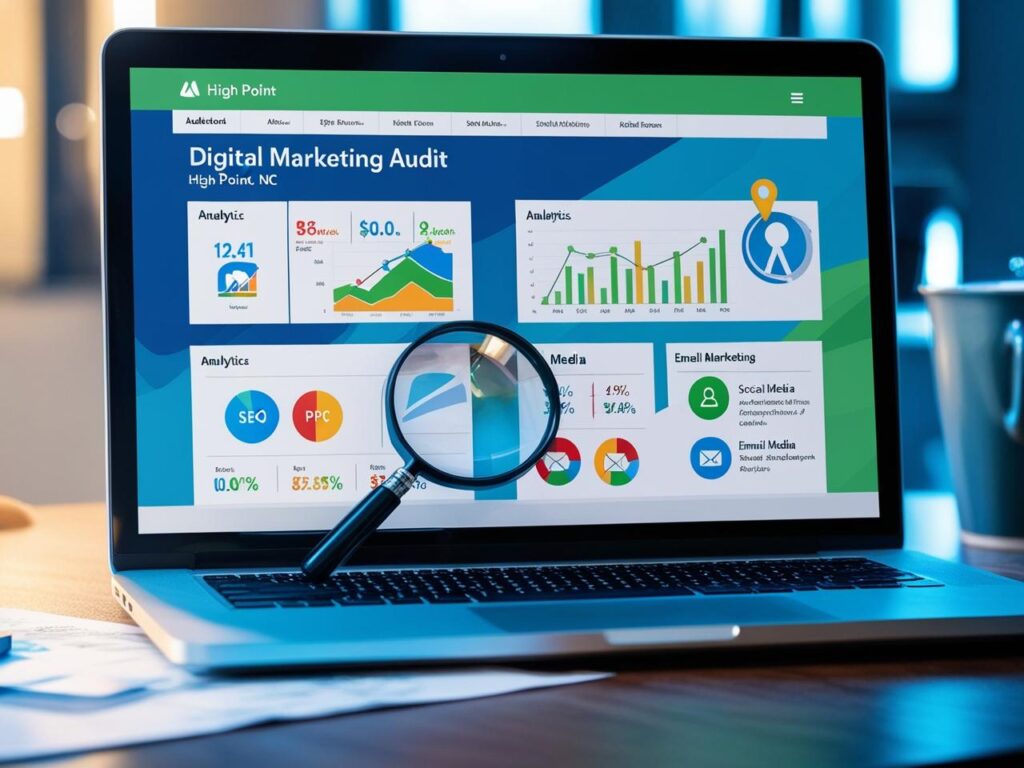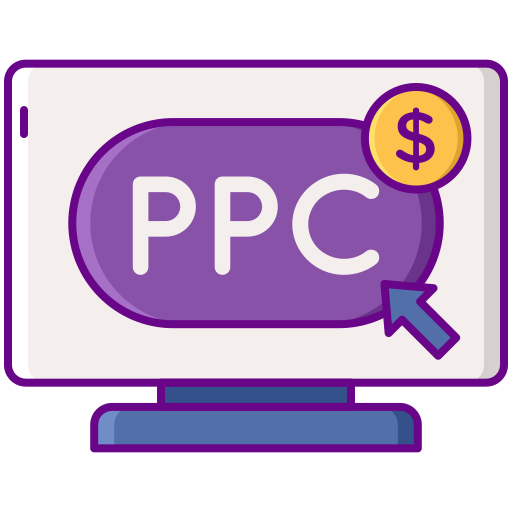
Introduction to Digital Marketing Audits
A digital marketing audit is one of the most critical processes a business can undertake to assess the effectiveness of its online strategies. For High Point, NC businesses, conducting a thorough audit is essential for understanding how well your marketing efforts are performing. Whether you’re engaging in SEO, PPC, social media marketing, or email marketing, auditing these strategies will reveal where you’re succeeding and where there’s room for improvement. In this post, we’ll guide you through the process of auditing your digital marketing channels, how to identify areas for improvement, and how to create an action plan to optimize your performance moving forward.
Why Perform a Digital Marketing Audit?
Before diving into the specifics, it’s essential to understand the importance of conducting an audit. Digital marketing strategies are complex, and measuring their effectiveness can be challenging without a clear process in place. Performing a comprehensive audit gives you:
- Clarity on Performance: Understand how well each marketing channel is contributing to your business goals.
- Opportunity to Improve: Identify underperforming areas and optimize them to achieve better results.
- Strategic Insights: Gain insights into how different channels can work together to strengthen your overall marketing strategy.
A well-executed audit will guide you in refining your tactics and ensure that your digital marketing budget is being spent effectively.
Step 1: Audit Your SEO Strategy
Search Engine Optimization (SEO) is one of the most important aspects of any digital marketing strategy. It helps your business rank higher on search engine results pages (SERPs), making it easier for customers to find your business online. A comprehensive SEO audit should cover several key areas:
1.1 Keyword Analysis
Start by evaluating the effectiveness of your keywords. Are you targeting the right keywords that align with what your potential customers are searching for? Use tools like Google Search Console to assess which keywords are driving traffic to your website. Ensure you’re optimizing for both short-tail and long-tail keywords, specifically focusing on location-based keywords like “SEO services in High Point, NC.”
1.2 On-Page SEO
On-page SEO refers to optimizing individual web pages to rank higher in search engines. This includes meta titles, descriptions, headers (H1, H2), image alt text, and internal linking. Evaluate your content for keyword relevance and ensure that each page is fully optimized. Don’t forget to check your site’s mobile responsiveness and loading speed, as these are essential ranking factors.
1.3 Backlink Profile
A strong backlink profile can boost your SEO efforts by signaling to search engines that your content is authoritative. Audit your backlinks to ensure they’re from high-quality, relevant websites. If you notice low-quality or spammy links, disavow them to avoid penalties.
1.4 Technical SEO
Check for any technical issues, such as broken links, duplicate content, or crawl errors. Tools like Google Analytics or Screaming Frog can help identify these problems. Technical SEO ensures that search engines can efficiently crawl and index your website, improving your visibility.
Step 2: Review Your PPC Campaigns
Pay-Per-Click (PPC) advertising can be a powerful way to drive targeted traffic, but only if the campaigns are optimized correctly. When auditing your PPC efforts, consider the following:
2.1 Campaign Targeting
Assess whether your campaigns are targeting the right audience. Are your Google Ads or Facebook Ads reaching the customers in High Point, NC that are most likely to convert? Review your targeting settings and ensure they align with your ideal customer profiles.
2.2 Budget Allocation
Check your PPC budget allocation. Are you spending too much on one campaign that’s underperforming, or not investing enough in high-converting campaigns? Use your Google Ads performance data to understand which ads are driving the most value.
2.3 Ad Copy and Design
Evaluate your ad copy and design for clarity and appeal. Your call-to-action (CTA) should be compelling and easy to understand. Testing different versions of your ad copy (A/B testing) can help you determine what resonates best with your audience.
2.4 Conversion Tracking
Ensure you have proper conversion tracking set up so that you can measure the effectiveness of your ads. Whether you want to track phone calls, form submissions, or online purchases, conversion tracking allows you to determine ROI and optimize your campaigns accordingly.
Step 3: Evaluate Social Media Marketing Efforts
Social media is a vital part of any digital marketing strategy, especially for local businesses in High Point, NC. To audit your social media strategy, take a look at the following:
3.1 Engagement Metrics
Track the engagement on your social media posts, including likes, shares, comments, and clicks. This will give you insight into how well your content is resonating with your audience. If engagement is low, consider tweaking your content to make it more relevant and appealing.
3.2 Consistency of Posting
Evaluate how frequently you are posting on platforms like Facebook, Instagram, and LinkedIn. Consistency is key to maintaining visibility and building brand awareness. Consider creating a content calendar to ensure you’re posting regularly and strategically.
3.3 Audience Growth
Examine the growth of your social media following. If your audience isn’t growing, it may indicate that your content isn’t reaching the right people or your targeting strategy needs improvement. Paid social campaigns can also help boost your reach.
3.4 Paid Social Campaigns
If you’re running paid social media campaigns, evaluate their performance. Are they driving qualified traffic to your website or increasing brand awareness? Measure your ROI and make adjustments to your targeting, creative, and budget if necessary.
Step 4: Audit Your Email Marketing Strategy
Email marketing remains one of the most effective methods for nurturing leads and retaining customers. Here’s what to look for during your email marketing audit:
4.1 List Quality
A clean, relevant email list is essential for successful campaigns. Make sure you’re regularly cleaning your list and removing inactive subscribers. Segment your list based on user behavior and preferences to send more targeted and personalized emails.
4.2 Open and Click Rates
Evaluate the open and click-through rates for your email campaigns. Low rates might indicate that your subject lines aren’t compelling enough, or your content isn’t valuable to your audience. Experiment with different subject lines and calls to action (CTAs) to improve performance.
4.3 Email Automation
Email automation helps nurture leads and increase customer retention. Audit your automated email sequences to ensure they’re timely and relevant. Are your emails aligned with the customer’s journey, and are they personalized based on the recipient’s behavior?
4.4 Email Campaign Metrics
Review your email campaign metrics, including bounce rates, spam complaints, and unsubscribe rates. High bounce rates or frequent unsubscribes might indicate issues with your email list or content that requires immediate attention.
Step 5: Creating an Action Plan for Improvement
Once your audit is complete, it’s time to take action. Based on your findings, create a clear, actionable plan to address the weaknesses identified and optimize your digital marketing efforts. Your action plan should include:
- Prioritizing Areas for Improvement: Focus on the areas that will have the most significant impact on your business.
- Setting Specific Goals: Create measurable goals for each marketing channel to track your progress.
- Regular Monitoring: Set up a routine for monitoring your efforts and adjusting strategies as needed.
If you’re curious about how audits can help improve your marketing efforts, check out our website optimization services in high point for real-world examples of how audits helped businesses in High Point.
Conclusion
A digital marketing audit is an essential step for improving your online marketing strategy. Whether you’re focusing on SEO, PPC, social media, or email marketing, auditing each element allows you to identify what’s working and where you can improve. By using data-driven insights to refine your tactics, you can enhance your performance and achieve your business goals more effectively.
















